 Petzlover
Petzlover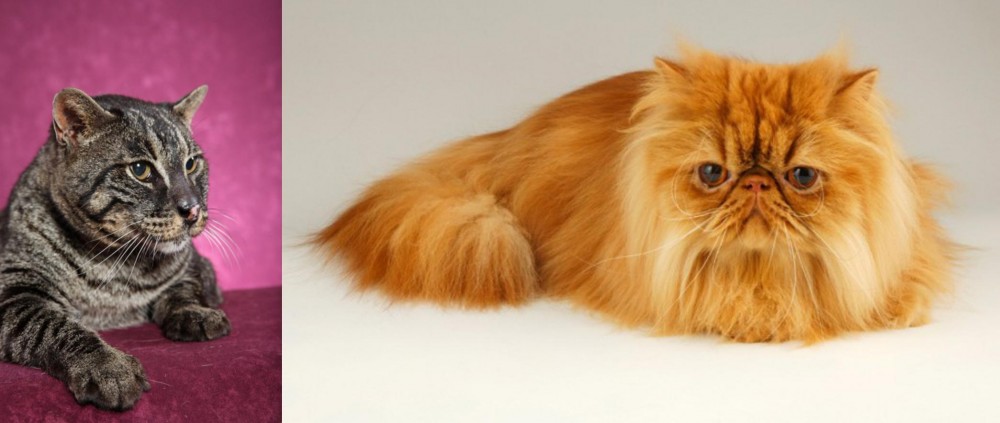 Machbagral is originated from United States but Persian is originated from Iran. Both Machbagral and Persian are having almost same weight. Machbagral may live 3 years more than Persian. Both Machbagral and Persian has same litter size. Machbagral requires Low Maintenance. But Persian requires Moderate Maintenance
Machbagral is originated from United States but Persian is originated from Iran. Both Machbagral and Persian are having almost same weight. Machbagral may live 3 years more than Persian. Both Machbagral and Persian has same litter size. Machbagral requires Low Maintenance. But Persian requires Moderate Maintenance
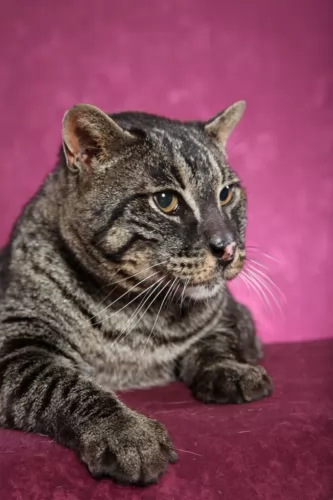 This is an experimental cat breed – a wildcat hybrid. It seems as though this cat was also developed in the United States like many of the other hybrid cats.
This is an experimental cat breed – a wildcat hybrid. It seems as though this cat was also developed in the United States like many of the other hybrid cats.
Also known as Bagral, Tthe Machbagral came about by crossing the wild Fishing cat – also known as the Asian Fishing cat and a Bengal cat or melanistic tabby spotted domestic cat.
Once again, humans wanted a cat that would look like a wild cat but that could be domesticated.
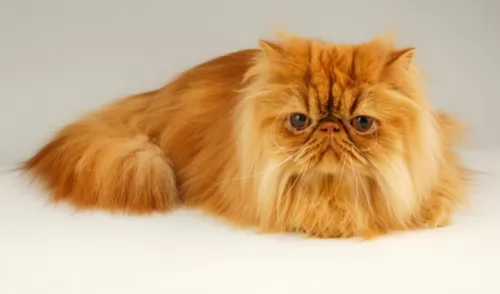 Cat lovers the world over know the Persian cat very well. It's a beautiful long-haired cat breed with its familiar round face and blunt muzzle.
Cat lovers the world over know the Persian cat very well. It's a beautiful long-haired cat breed with its familiar round face and blunt muzzle.
It is not really known when long-haired cats first appeared, or where the Persian originated but their history stems from Persia or Iran as it is known today, where it seems they were first sighted.
The cats were grey-coated and some were white and soon the cats arrived in Britain. They were introduced to the United States in the 1900s. The cat was developed first by the English, and then also by American breeders after the Second World War and the breeding of these cats has also meant a lot of coat colors.
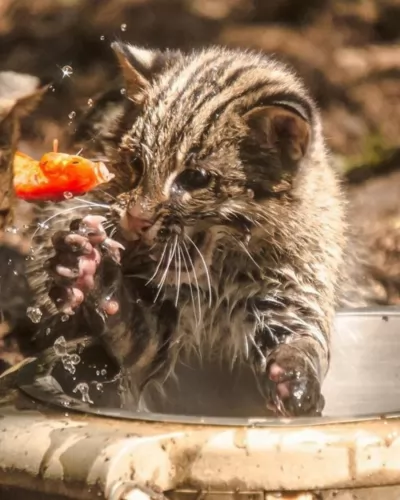 The Machbaral is a medium to large-sized cat and can weigh up to 7kg. It is described as a stocky cat. The head is large with fairly small ears. The fur of the Machbagral will be dense and medium length with a thick fluffy tail. The color is black with lighter tips.
The Machbaral is a medium to large-sized cat and can weigh up to 7kg. It is described as a stocky cat. The head is large with fairly small ears. The fur of the Machbagral will be dense and medium length with a thick fluffy tail. The color is black with lighter tips.
The Machbagral cat is very friendly and intelligent and like so many hybrid cats he loves playing in water. If you have an outside cage for him, it should have a small pool.
He is a cat that loves his human family and behaves much like a dog. You can teach this cat to walk on a leash.
You need to bear in mind that because of the wildness in the Machbagral, there will no doubt be some aggression. They can also be quite solitary by nature and may never adjust to being in a social setting. These cats are also not 100% predictable.
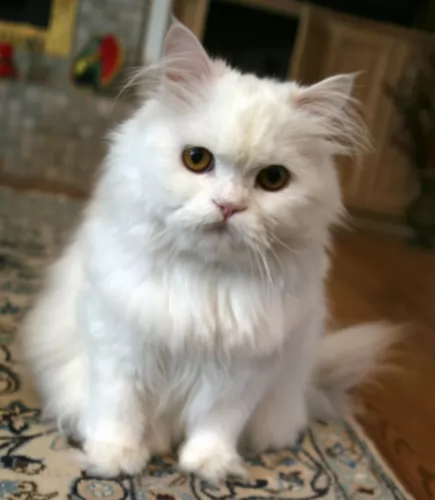 The Persian cat is a medium- to large-sized cat and is heavily boned. He can weigh between 3 and 6kg.
The Persian cat is a medium- to large-sized cat and is heavily boned. He can weigh between 3 and 6kg.
He has stocky legs, a thick neck, small ears, round head, round eyes, and the face is flat or blunt. The kittens are gorgeous balls of fluff.
The coat of the Persian is thick, long, and silky. People many times think only of a white Persian, when in fact the cat comes in many colors and patterns. Eye color for the cat can be blue, green, brown, copper or even odd-eyed.
The Persian isn’t the most active of cats, so attention will need to be given to exercising the cat so as to manage his weight. This cat will also need to have his nutrition controlled to stay in shape and in good health.
Persians enjoy games with their human family and will need some toys to encourage play and exercise.
He is placid and calm but that doesn’t mean he can’t have bursts of energy. They’re quieter than other cats, are sweet-natured, preferring to live in quieter, less boisterous households.
They aren’t loudly vocal but communicate with their eyes and their soft voices. They won’t get on well with small, noisy children but can be loving pets and companions of older children who allow them their own space.
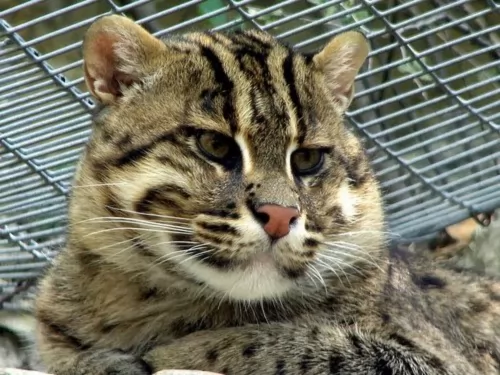 The Machbagral, just like some of the other hybrid cats there are, can be wonderful to own. But sadly these hybrids should be discouraged as pets.
The Machbagral, just like some of the other hybrid cats there are, can be wonderful to own. But sadly these hybrids should be discouraged as pets.
They can make wonderful pets no doubt, but there is always that unpredictable behavior with them.
There are so many cats in shelters today, many of them are hybrids because people had no idea that the wild side of the hybrid such as the Machbagral is always lurking there, ready to come out.
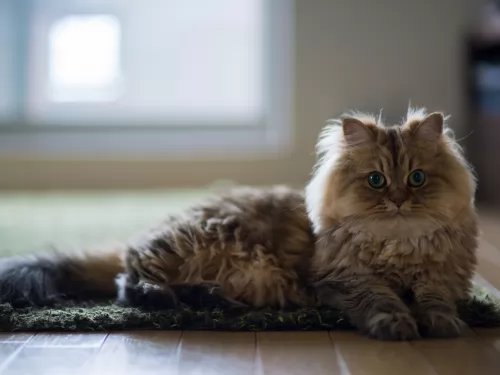 The amicable personality of the Persian cat makes it easy to have these cats in your home. The long hair becomes a bit of an issue as the cat sheds quite a bit.
The amicable personality of the Persian cat makes it easy to have these cats in your home. The long hair becomes a bit of an issue as the cat sheds quite a bit.
They’re sweet, quiet cats and they don’t demand attention from you. They are more than happy just lying quietly in a warm spot. They are calm, loving cats and it's no wonder that they are still such a popular breed of cat.
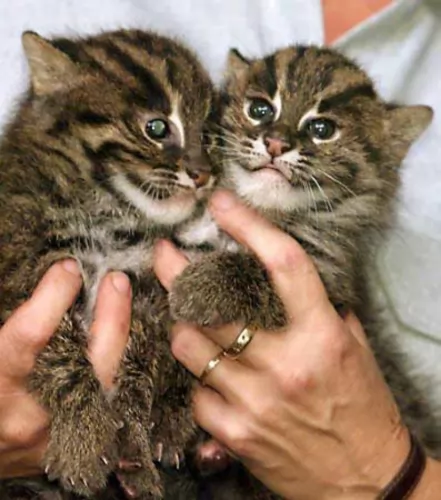 You need to know that interbreeding wild cats with domestic cats still has wildness in a cat.
You need to know that interbreeding wild cats with domestic cats still has wildness in a cat.
The truth is, there are behavioral complaints from owners of these hybrid cats.
No matter how wonderful the Machbagral seems to be as a pet, at some time or other he will display aggression and also failure to use a litter box.
These hybrids usually mark their territory by urination and spraying and often can’t learn to use a litter box. Unlike with a proper domestic cat, neutering or spaying a hybrid cat won’t really change their behavior of urinating inside your house.
Also, because hybrid cats such as the Machbagral are unnatural breeding, there can be health issues. One of the more common illnesses among hybrid cats include digestive issues, of which IBD is one. This is a bowel disease and it can cause chronic diarrhea with your cat.
Another medical issue is Hypertrophic Cardiomyopathy. Also, another concern is that while regular cat vaccines protect your regular cat from some deadly cat diseases, they may not be approved for use in hybrid cats, and if they are approved, they may not be effective.
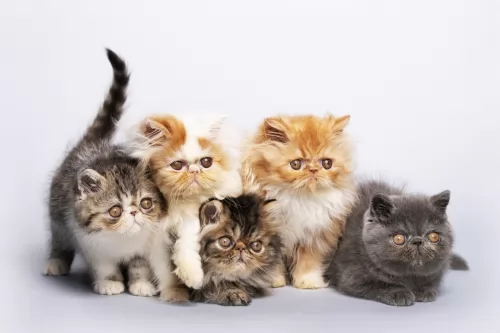 The structure of this cat’s head can mean some health problems. Hereditary Polycystic kidney disease is prevalent with the Persian cat. It is an inherited condition that causes cysts to form in the kidneys. These cysts are actually present from birth, growing larger over time and interfering with kidney function and ending in kidney failure.
The structure of this cat’s head can mean some health problems. Hereditary Polycystic kidney disease is prevalent with the Persian cat. It is an inherited condition that causes cysts to form in the kidneys. These cysts are actually present from birth, growing larger over time and interfering with kidney function and ending in kidney failure.
Also, with a larger breed cat such as the Persian, hip dysplasia is a problem.
Persians are also susceptible to malocclusion which means ‘incorrect bite’. This particular condition can affect the cat’s ability to grasp and actually hold food. So much so in fact, that now pet food manufacturing companies have even developed specially-shaped kibble to cater particularly for the Persian.
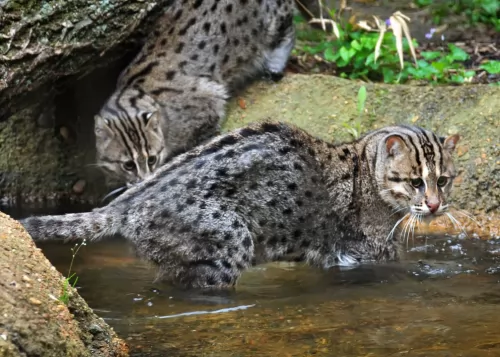 Most cat owners with basic cat care knowledge will be able to take care of their Machbagral. You could say that there is a little bit more specialized care with these hybrid cats as they will require an outside cage as they are cats with a wild side.
Most cat owners with basic cat care knowledge will be able to take care of their Machbagral. You could say that there is a little bit more specialized care with these hybrid cats as they will require an outside cage as they are cats with a wild side.
Feline hybrids are larger than domestic cats and can exhibit a wild temperament, so you have to bear in mind they require careful and different handling to a regular cat.
A diet of commercial pet food may not be sufficient for a hybrid such as the Machbagral and your vet may well be able to advise you on the feeding requirments of these hybrids.
Since cats are carnivorous, they will need to be fed food that is high in protein. You need to understand how to read labels on commercially manufactured cat foods and to avoid those that have more carbohydrates in them and less meat. Feeding you cat such a diet will ensure health issues later on.
Provide your pet with all the things needed to make him content as can be. Food and water bowls, paddling pool, toys, sleeping area. You want to surely invest in collar and tag as these cats often try to get away.
You want to make sure you have an outdoor enclosure for your Machbagral. These hybrids are indoor- and outdoor cats. Because they often don’t learn to use a litter box they need to be outside in an enclosure for some of the time. They are certainly not indoor cats.
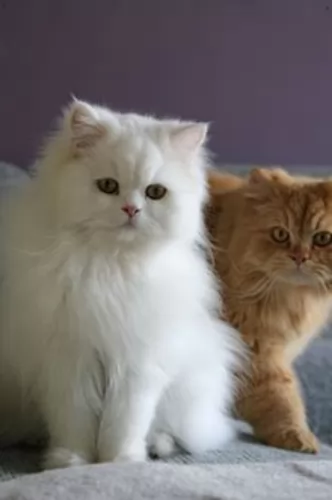 The Persian cat’s coat is long and silky and because he is a fairly heavy shedder, he will require regular brushing – certainly once or twice a week to get rid of that loose hair. It is important to brush and also cut the hair so as to get rid of the tangled knots that form.
The Persian cat’s coat is long and silky and because he is a fairly heavy shedder, he will require regular brushing – certainly once or twice a week to get rid of that loose hair. It is important to brush and also cut the hair so as to get rid of the tangled knots that form.
While brushing your Persian, make sure that his eyes and nose are clear. This is important because the flat face creates problems with these cats.
Excellent cat food for your Persian involves reading labels and understanding what brands are best for your beautiful cat. The Persian cat is a carnivore and will require high-quality food rich in protein.
Speak to your vet if you are in any doubt about the best food for your cat’s health and wellbeing. Make sure your pet has a constant supply of fresh, cool water.
Make sure to keep the litter box clean. Buy a small rake from the pet shop and rake up your cat's feces every single day and dispose of them.